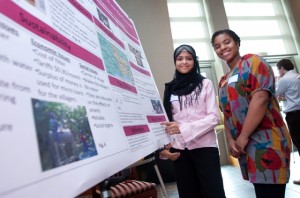
Thafhim "Muna" Siddiqua '13, left, and Taneesha Tate-Robinson '13 presented their project at Lafayette's Community-Based Learning and Research expo.
Safe drinking water is a necessity that most Americans take for granted. But, in some parts of the world, like Barisal, Bangladesh, it is a luxury many don’t have. This summer, Thafhim “Muna” Siddiqua ’13 (Silver Spring, Md.) and Taneesha Tate-Robinson ’13 (Bowie, Md.) will take steps to create change in Bangladesh.
The students have secured a $10,000 Davis Projects for Peace grant for their Save Me from Arsenic project. This is now the sixth year in a row that Lafayette students have received Projects for Peace grants to support research and community service projects.
Tackling arsenic poisoning in Bangladesh is a project that hits home especially for Siddiqua, who was born in the country. She and Tate-Robinson will travel to Barisal this summer to test tube-wells and educate the villagers on the symptoms of arsenic poisoning as well as ease the social stigma associated with the condition. Siddiqua, a civil engineering major, and Tate-Robinson, an international affairs major, recently presented their research at the College’s Community-Based Learning and Research expo.
After exhaustively researching arsenic-tainted groundwater in Bangladesh, Tate-Robinson found that there is no countrywide initiative to combat its devastating effects. Siddiqua traveled to Bangladesh this past summer to gather data, interview villagers, and speak with officials from the Impact Foundation to further understand the effects arsenic poisoning has on humans. Their research found that of the 125 million inhabitants of Bangladesh, between 35 and 77 million are at risk of drinking contaminated water.
“By educating the village, we hope to prevent cases of severe illness and even death due to untreated cases of arsenicosis and their inability to obtain safe drinking water,” says Siddiqua. “At the end of the project, we expect to have a well-trained village in Barisal that will be able to identify individuals with arsenicosis and have a committee able to improve arsenic problems in the village.”
In their proposal, Siddiqua and Tate-Robinson explain that many people in Bangladesh believe arsenic poisoning is contagious or a curse. Parents are reluctant to let their children play with children suffering arsenic poisoning, and patients can be shunned within their villages. A woman’s attractiveness lies in her beauty, which is often judged by her pale complexion, making it harder, and in some cases impossible, for single women suffering from arsenic poisoning to marry. Once married, women face the risk of divorce if they develop arsenicosis skin lesions.
While in Bangladesh, Siddiqua and Tate-Robinson will conduct sustainability studies to determine if an arsenic-removal system can be installed in the village in the future. They will be working with a non-governmental organization called Grameen Development Society (GDS) to ensure they have the resources needed to complete the project. GDS selected the village in Barisal and will continue the training after the students depart.
After conducting the sustainability studies this summer, the student team plans to work with advisers John Greenleaf, visiting assistant professor of civil engineering, and Art Kney, associate professor and head of civil and environmental engineering, to install a permanent arsenic-removal system. Last year, they observed via webcam the installation of a similar system in West Bengal, India, that Greenleaf completed with Joe Goodwill ’04, an engineer with Black & Veatch. If all goes well, Siddiqua and Tate-Robinson hope to make the project a yearly effort that can be implemented by future Lafayette students.
See a list of recent Lafayette recipients of national and international scholarships and fellowships for undergraduate and post-graduate study.
For information on applying for scholarships and fellowships, contact Julia A. Goldberg, associate dean of the College, (610) 330-5521.

1 Comment
Dear Respected Professor Ms. Julia Goldberg, Mr. Kney, Lafayette College USA and All Water for People
Warm greetings from Grameen Development Society (GDS), Barisal, in Bangladesh. Thank you for sending International Affairs student Ms. Taneesha Tate-Robinson ’13 and Environmental Engineering student Ms. Thafhim Siddiqua ’13 to our organization. In the meantime they completed their task and assignment successfully with our active help and cooperation as per your tentative schedule, we did our best to help complete the work. The arsenic situation in our area of operation is dreadful. But people in the locality are ignorant about it.
So, they need awareness, training, health education, and health care centers to provide them with drinking water, and for this water treatment plants and rain water harvesting systems should be established. These are very essential and urgent; otherwise, the situation will further deteriorate.
All reports and documents will be submitted to your sending International Affairs student Ms. Taneesha Tate-Robinson ’13 and Environmental Engineering student Ms. Thafhim Siddiqua ’13. We invite you to please visit our country, Bangladesh. To see it with you own eyes. We wish to work on the problem of arsenic poisoning together in our country.
Please feel free to contact me regarding our organization or if you have any questions, we can be reached by email, gdsbsl@gmail.com, bslgds@yahoo.com.
Thanks for all.
Yours sincerely,
Mr. Zahid Hossain Khan
Executive Director
GDS – Grameen Development Society
Barisal- 8200, BANGLADESH
Comments are closed.